By Sue-Ann Wayow
TRINIDAD-born scientist Dr Shakuntala Haraksingh Thilsted, who was awarded the World Food Prize 2021 last week, is scheduled to speak at an event to be hosted by Trinidad and Tobago next month.
Thilsted is the seventh woman, first woman of Asian heritage, and the 25th CGIAR, formerly (Consultative Group for International Agricultural Research) a global research partnership for a food secure future researcher, to be awarded the prize.
Prime Minister Dr Keith Rowley, Minister of Agriculture Land and Fisheries Clarence Rambharat and Opposition Leader Kamla Persad-Bissessar all congratulated Thilsted.

The World Prize Foundation stated that the World Food Prize is the most prominent global award recognising an individual who has enhanced human development and confronted global hunger through improving the quality, quantity or availability of food for all.
Rambharat told AZPNews.com that Trinidad and Tobago will host the local version of the United Nations Food Systems Dialogue on June 16. This Dialogue is being held by UN members around the world and it leads to the UN Summit of Food Systems to be held towards the end of 2021. Dr Haraksingh is part of the team working on the TT Dialogue.
He said her family was well known in academic circles as significant contributors to regional development.
Rambharat said, “Dr Haraksingh’s brother is former ULF Senator Dr Kusha Haraksingh, who was also twice appointed Chairman on Caroni (1975) Limited. Dr Kusha’s wife is Dr Indra Haraksingh, a UWI lecturer at the forefront of solar technology.
“Other family members are academics in physics and other areas.

“Dr Shakuntala Haraksingh started her career in the ministry of agriculture and has distinguished herself in both the scientific and practical issues of seafood and hunger. Her’s is a career that is so distinguished and so contributory to global development, that her latest and most unique achievement is inspirational and also important to T&T’s position in the commitment to feed ourselves and keep our citizens healthy.”
Thilsted, who was born in Reform Village, attended Naparima Girls’ High School before going on to earned a Bachelor’s of Science degree in Tropical Agriculture in 1971, from the University of West Indies, St Augustine.
After graduating, she worked as the first female agricultural officer at the Ministry of Agriculture in Tobago. While in Tobago she met her husband Finn Thilsted, a Danish citizen, and would migrate to Denmark with him.
In 1980 she received her Ph.D. in Physiology of Nutrition from the Royal Veterinary and Agricultural University, Denmark, where she worked for many years.
Her research focused on food and nutrition security in many developing countries, especially in Asia and Africa.
Since 2010, she has been a researcher at WorldFish, headquartered in Penang, Malaysia.
WorldFish is part of CGIAR.
Thilsted’s husband Finn is a former Danish ambassador to Bangladesh, Kenya and Nepal, the World Prize Foundation stated.
CGIAR posted on its website that Thilsted’s groundbreaking research insights and landmark innovations have led to the development of nutrition-sensitive approaches in aquatic food systems and integrated food production from land and water. She was the first to establish that many small fish species commonly eaten across Southeast Asia are an important source of essential micronutrients and fatty acids, and improve the absorption of nutrients in plant-based foods.
Her research has reshaped scientific understanding of the benefits of fish in diets, demonstrating that these affordable and locally available foods offer life-changing benefits for children’s cognitive development in their first 1,000 days of life and the nutrition and health of their mothers.
On being named the 2021 World Food Prize Laureate, Thilsted said, “I am truly honoured to receive this award. I feel humbled to be placed in such distinguished ranks of past laureates. As a scientist, I feel this award is an important recognition of the essential but often overlooked role of fish and aquatic food systems in agricultural research for development. This award is a major acknowledgment of the urgent need to prioritize fish and aquatic foods in nutrition policies and program interventions at national and global level.
“It is also an important acknowledgment for the insights, voices, and perspectives of millions of people from low- and middle-income countries. These are crucial to shaping the global discourse on nutrition and public health, as well as our shared call to action for a sustainable food systems transformation towards healthier and resilient diets that work for people and the planet.”
![]()













